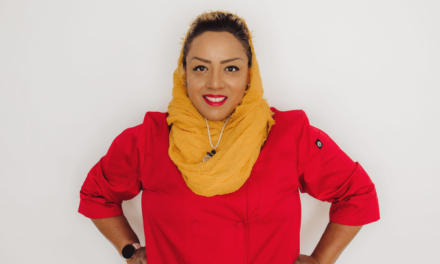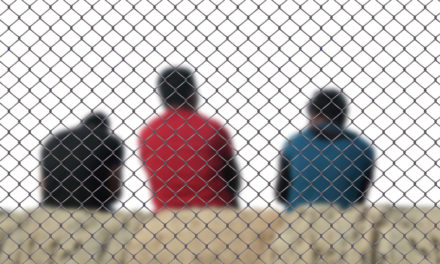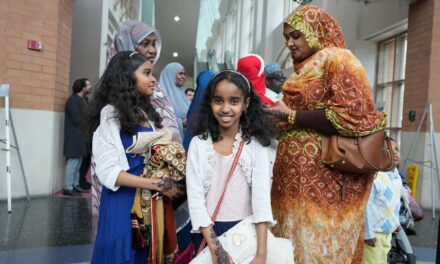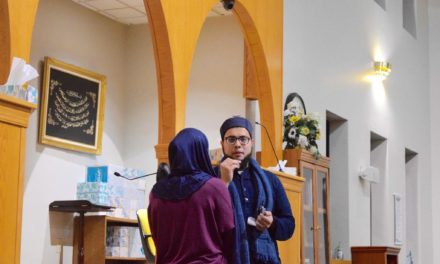
A small but devoted group of members of Milwaukee’s Sudanese community created MKE4Sudan (Milwaukee for Sudan) six months ago to raise awareness of the crisis in Sudan.
Sudan is 15 months into what the United Nations called this week in a press release “the world’s worst humanitarian crisis,” yet no one seems to care, say members of Milwaukee’s Sudanese community who are working to bring attention to the crisis.
World’s worst humanitarian crisis
“Bringing attention to this issue is extremely important,” said Nagwa Ahmed of Franklin, a co-founder of MKE4Sudan, in a recent interview with the Wisconsin Muslim Journal. “In a country of 50 million, half the people are in great need of humanitarian assistance. The numbers say it all!”
Over the next three months, an estimated 25.6 million people will face severe food insecurity as the conflict spreads and coping mechanisms are exhausted, according to the International Organization for Migration. “Urgent funding is required to scale up the response and reach those still in desperate need of food, shelter, water, health services and specialized protection,” the IOM reports.
Since the crisis began in mid-April 2023, the United Nations reports more than 18,800 people have been killed and upwards of 33,000 injured.
More than 10.7 million people, nearly half of them children, are displaced inside Sudan and more than 2 million people have fled as refugees into neighboring countries, the IOM reports. “One out of two are struggling to put food on the table every single day.”
“Sudan’s humanitarian crisis for children is, by numbers, the biggest in the world,” a UNICEF press release states. “It is also a crisis of neglect,” said UNICEF spokesperson James Elder, quoted in the Aug. 13 release.
“Yesterday I spoke to a senior medical worker who gave an insight into the magnitude of sexual violence during this war. She explained she had direct contact with hundreds of women and girls, some as young as 8, who have been raped. Many were held captive for weeks on end. She also spoke of the distressing number of babies, born after rape, who are being abandoned.
“Thousands of children have been killed or injured in Sudan’s war … Five million children have been forced to flee their homes—a staggering average of 10,000 girls and boys displaced every single day … many multiple times.”
UNICEF’s Famine Review Committee has determined famine is taking place in Zamzam camp, the first determination of famine in more than seven years and only the third time a famine determination has been made since the monitoring system was created 20 years ago.
“Beyond Zamzam, an additional 13 areas in Sudan are on the brink of famine,” Elder added. “Without action, tens of thousands of Sudanese children may die over the coming months … And any disease outbreak will see mortality skyrocket.”
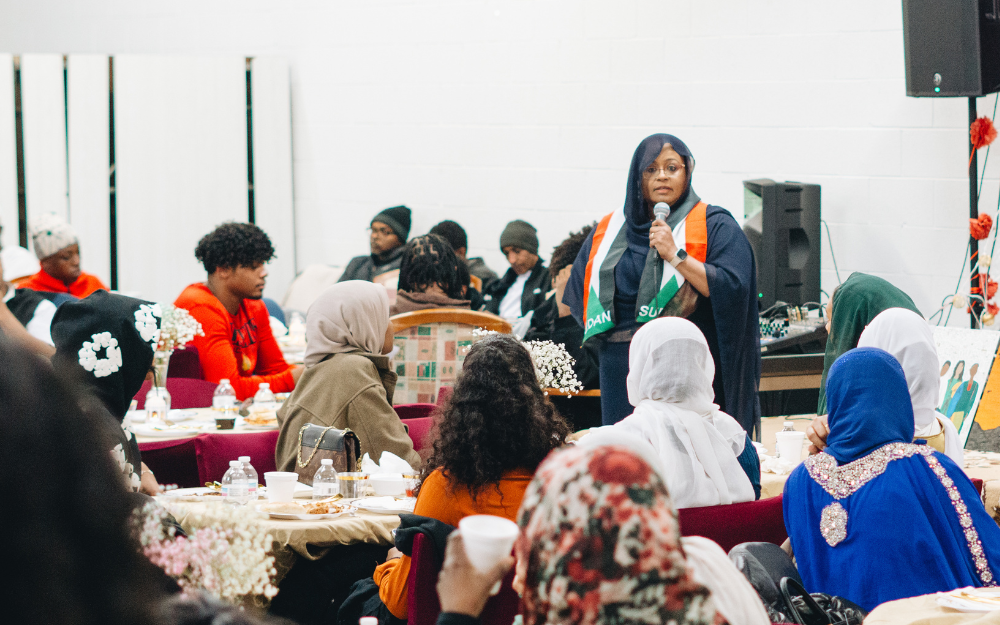
Calling attention to Sudan
Ahmed, a Milwaukee native and resident of Franklin, and Lojain Gamar of Milwaukee began meeting together a year ago, brainstorming ways to raise awareness of the devastating tragedy unfolding in Sudan. By December, they joined with other young members of Milwaukee’s Sudanese community and created MKE4Sudan (Milwaukee for Sudan), an organization whose tag line is “Igniting change, prosperity and promoting peace for Sudan.”
Since then, MKE4Sudan held a fundraiser dinner at the Sudanese Community Center in Wauwatosa that raised $4,000 for displaced people in need and several events to raise awareness among the general public of the crisis in Sudan. They held a rally in downtown Milwaukee with a banner drop on the Brady Street bridge and teach-in at the University of Wisconsin-Milwaukee protest for Palestine encampment. They also advertised a “Call to Action,” asking U.S. Rep. Gwen Moore’s constituents to call on their representative to speak up for Sudan in Congress.
None of these efforts drew support beyond Milwaukee’s Sudanese community, Ahmed said. And local media did not cover their efforts, she and Gamar noted.
“People are ignoring what is going on,” Ahmed explained. “People like to call it a forgotten war, but it’s not forgotten. We Sudanese people around the entire world have been working, yelling out to the world. We are just not seeing support from anyone else.”
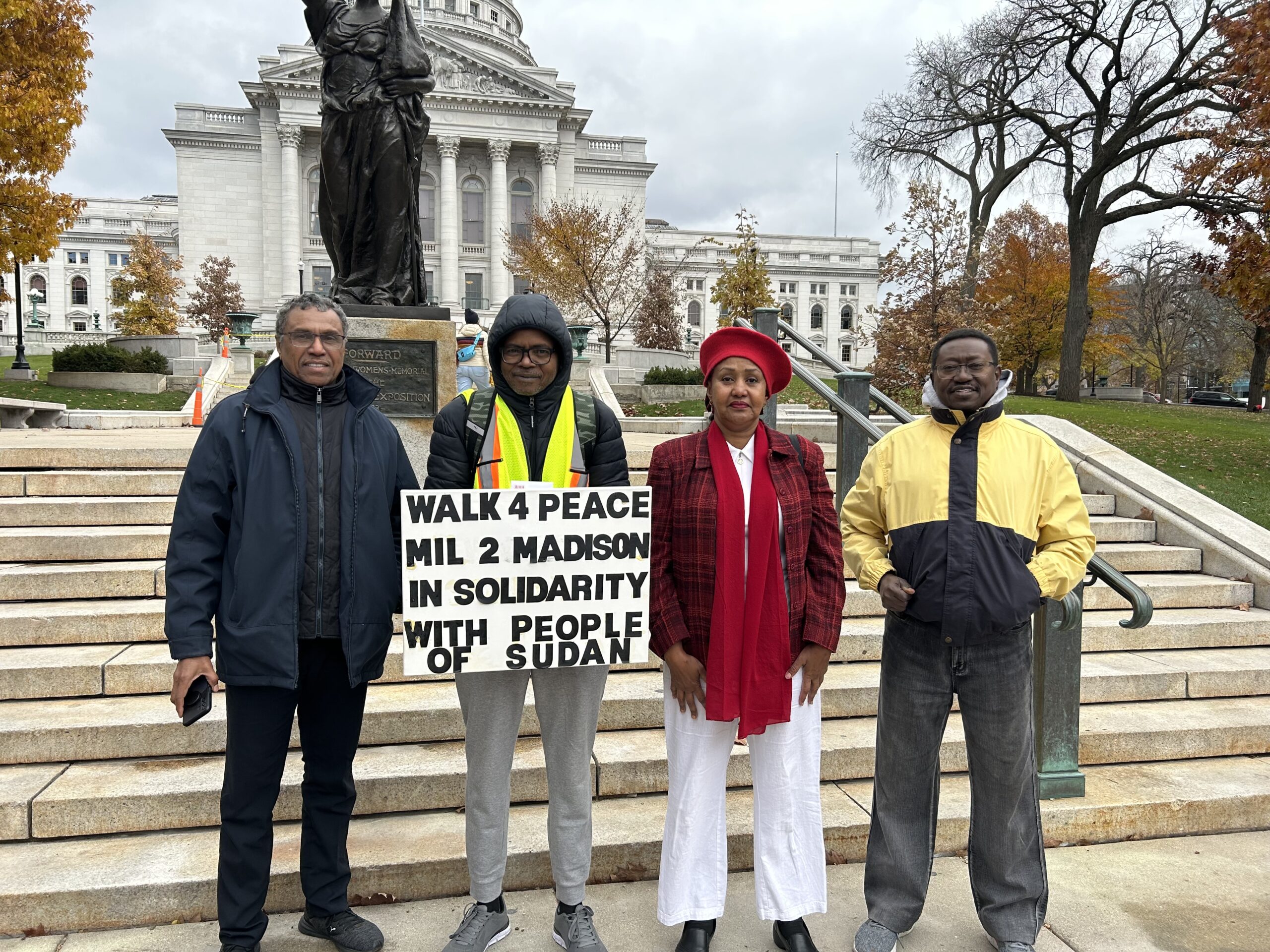
Jalal Yabis, 54, of Milwaukee walked 82 miles from Milwaukee’s City Hall to the Wisconsin State Capitol in Madison to deliver a letter to Gov. Evers about the crisis in Sudan.
Worried about relatives
Both Gamar and Ahmed have close relatives in Sudan who are now displaced.
“I feel like everyone in our community has someone who was displaced or killed, or they’re currently supporting,” Gamar said. “It’s had a great impact on the Sudanese community here in Milwaukee. Not only is everyone having to send like double or triple the money they usually send to help people there, we also have to deal with the trauma of our country being destroyed and our families displaced.”
Many like Gamar’s mother check social media as soon as they wake up each day to see if there is any news from family members. Gamar and her mother wait anxiously for word from relatives that comes sporadically. “Whenever they can get access to the internet,” she said.
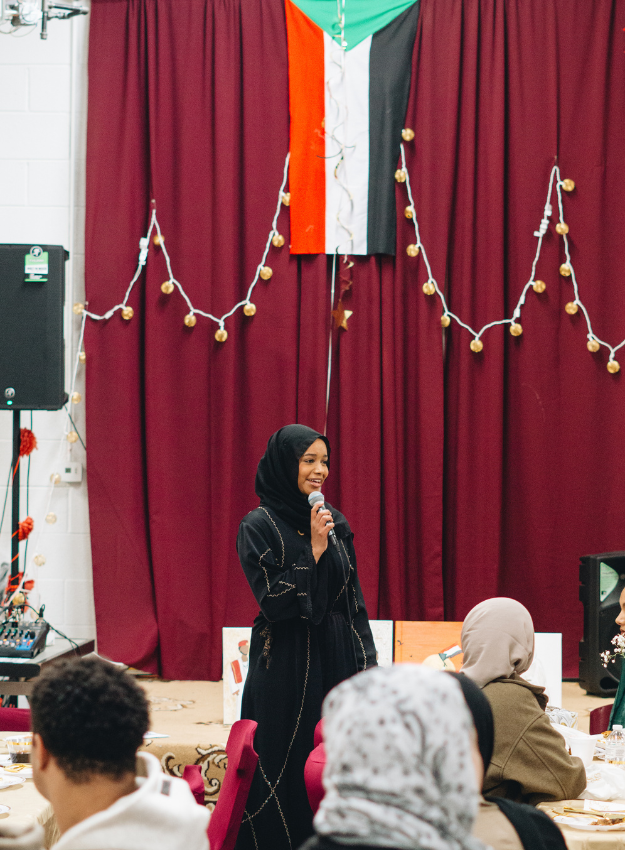
Lojain Gamar
Gamar shared the story of relatives who fled when they heard a militia was coming to their town. “As they were leaving with whatever they grabbed and put in the car, they were stopped. When your car is stopped, you have two choices, to get out and run or sit in the car and God knows what will happen to you.”
Her relatives decided to run. They ran for about seven hours, they told her, crossing a dangerous bridge and traveling for two more days without food or water.
They are safe now, but “the trauma, stress and anxiety go on,” she said. “They saw the person who was driving their car shot in the back. They passed an old woman they think was dead, maybe from the heat or no water or she could have even been shot. Seeing stuff like that is hard to get over.”
And they are living in a country where there is looting and raping, displacement and famine, and where prices are rising exponentially, she explained.
“Not everyone has been able to leave. For those left in the country, there are no jobs, no schools operating, no paychecks. Schools have become shelters where people wait for nonprofit organizations to bring food. It is very demeaning.”
For Sudanese in Wisconsin, the silence about the situation in Sudan carries its own trauma, they said.
“I feel when situations happen in African countries, they are often pushed under the rug,” Gamar said. “That’s been the biggest frustration of the Sudanese community here. Our relatives are facing what is the largest crisis in the world right now and even a lot of people in our Muslim community don’t know much about it. It’s been an ongoing struggle but it’s something we will continue fighting for.”
Ahmed’s family had similar experiences. She recalled a midnight phone call. “I was getting ready to sleep when my mom got a call from her brother. I came rushing from my room. Our worst nightmare came true.” Her relatives in Sudan were also forced to flee their family home. “Everyone has a story about where they went and what happened to them. It’s heartbreaking to hear,” she said.
Walking for Sudan
Jala Yabis, 54, a Sudanese refugee who settled in Milwaukee spent months reaching out to the media to no avail, he told the Wisconsin Muslim Journal. Then he came up with what he thought would be a sure-fire plan.
Yabis decided to “walk for Sudan” from Milwaukee’s City Hall to the Wisconsin State Capitol in November, a trek of 82 miles that would take him four days. He carried a sign that said, “Walk 4 Peace, Milwaukee 2 Madison in Solidarity with People of Sudan.”
At the Capitol, he would deliver the following letter to Wisconsin Gov. Tony Evers:
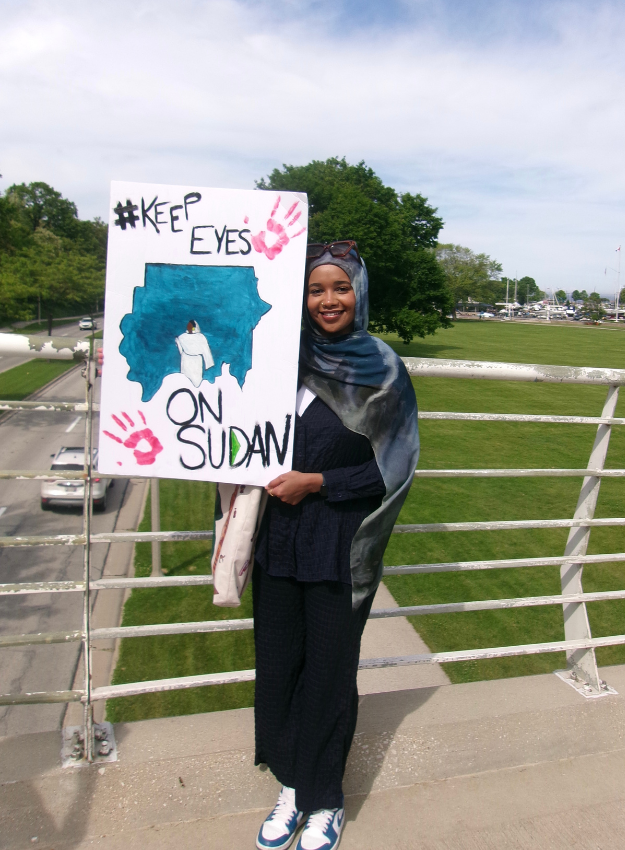
Lojain Gamar
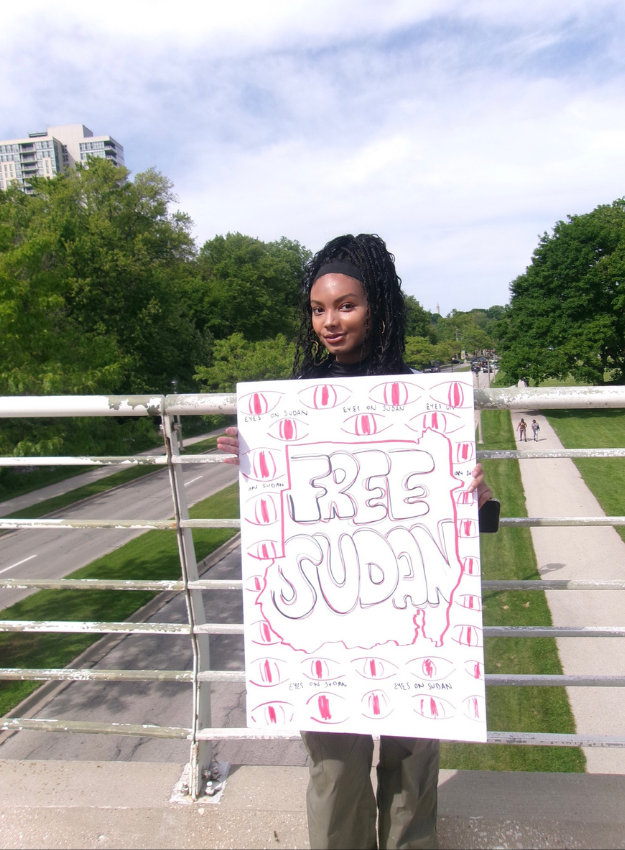
Nagwa Ahmed
Dear Governor Evers:
My name is Jalal Yabis. I’m a member of the Sudanese American Community of Wisconsin. I have walked 82 miles, from the City of Milwaukee to the State Capitol steps, hoping to bring your awareness to the ongoing war in Sudan.
Since fighting erupted April 15 (2023) between the Sudanese Armed Forces and the paramilitary Rapid Support Forces, the UNHCR reports 4.5 million people (about twice the population of New Mexico) have been displaced inside Sudan, while 1.2 million have fled to neighboring countries, including Chad, Egypt, South Sudan, Ethiopia and the Central African Republic.
Across the country, an unimaginable humanitarian crisis is unfolding, as increased people are displaced by the relentless fighting. An entire population is being slowly eliminated before the eyes of the international community.
The efforts of the people around the globe to help those in need in the Sudan are needed. It is long overdue for the United States government to take urgent and meaningful action to help alleviate the suffering of the Sudanese people. The Sudanese American Community of Wisconsin appreciates you and your government for the significant effort of making Wisconsin great. Thank you. We would also appreciate it if you could bring the contents of the present letter to the attention of the members of the state governments and the Democratic Party about the need for urgent humanitarian help for Sudan.
Sincerely, Jalal Osman Yabis on behalf of the Sudanese American Community of Wisconsin
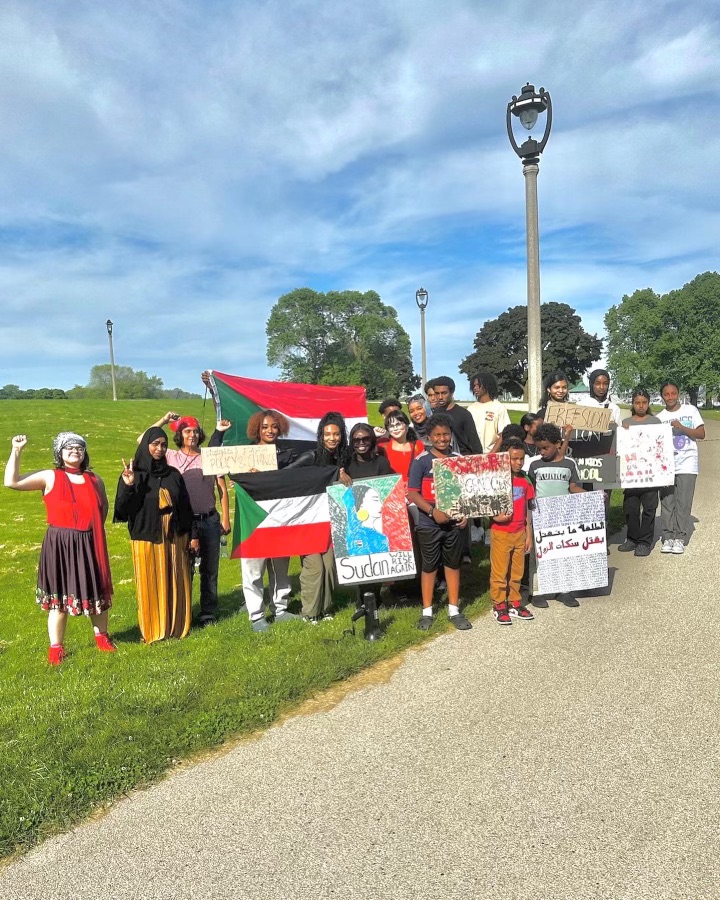
MKE 4 Sudan
Before leaving Milwaukee, Yabis reached out to all the local news outlets. He spoke to reporters he encountered who were on the street to report on a hit and run. He also sent emails the day before he left. None of the Milwaukee news outlets covered his walk.
When he arrived at the State Capitol in Madison, he gave the letter to a staff member who said it would be delivered to Gov. Evers but he was not invited to see the governor. It has been nine months and Yabis has not yet received a response.
However, a reporter from Madison 365 noticed Yabis’ sign and asked him about it, resulting in the only news coverage of his 4-day journey on foot.
“I had never done anything like this in my life,” Yabis told WMJ. “I’ve been athletic all my life but I’m not a walker. I just thought it would be a way to let the public know what is going on in Sudan.
“I was disappointed to be honest, I was disappointed by the City of Milwaukee, the media and the governor. I had contacted all of them but unfortunately nobody showed up.
“Nobody’s talking about it as a serious humanitarian crisis that is taking place right now.”
